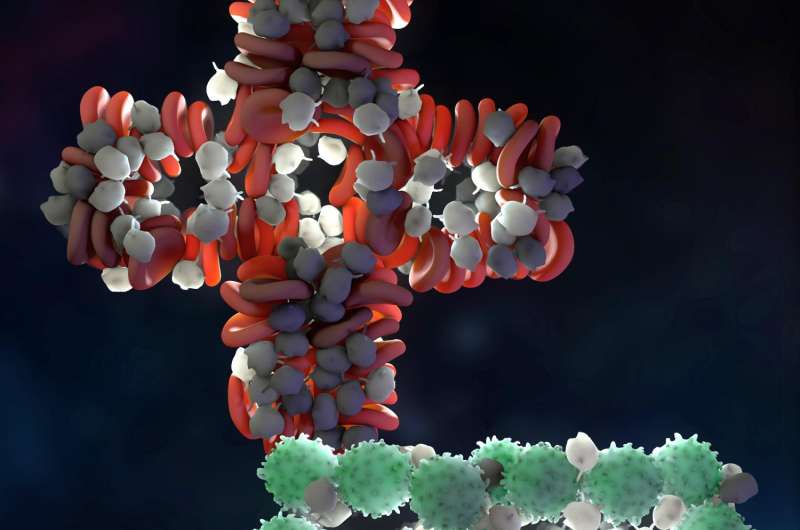Platelets suppress T cell immunity against cancer

Blood platelets help disguise cancer from the immune system by suppressing T cells, report scientists at the Medical University of South Carolina (MUSC) in the May 5, 2017 issue of Science Immunology. In extensive preclinical tests, a promising T cell therapy more successfully boosted immunity against melanoma when common antiplatelet drugs such as aspirin were added.
Zihai Li, M.D., Ph.D., senior author on the article, is chair of the MUSC Department of Microbiology and Immunology, the program leader for the Cancer Immunology Research Program at MUSC Hollings Cancer Center, and the SmartState Sally Abney Rose Chair in Stem Cell Biology & Therapy. Li studies how tumors hide themselves from the immune system.
Li's team found that platelets release a molecule that suppresses the activity of cancer-fighting T cells. That molecule, unsurprisingly, was TGF-beta, which has been recognized for decades for its role in cancer growth.
Yet this study is the first of its kind. Most TGF-beta is inactive. Li and his group found that the surface of platelets has a protein called GARP, a molecular hook that is uniquely able to trap and activate TGF-beta. Platelets, which are small cell fragments that circulate throughout the blood and are normally involved in clotting, become the major source of activated TGF-beta that invading tumor cells use to suppress T cells. In other words, platelets help give tumors their invisibility cloak from the immune system.
Scientists have known for several years that certain cancers suppress T cells to avoid the immune system. That is why adoptive T cell therapy is one of the most promising advances in modern cancer treatment. It is a type of immunotherapy that awakens the immune system by retraining a patient's T cells to recognize their cancer. T cells are isolated from a patient's blood and retrained, or "primed," to recognize tumor cells. They are then injected back into the patient's bloodstream where they can now hunt and fight cancer.
There was some evidence that platelets might make cancer worse. For example, patients who have excessive clotting related to their cancer almost always have a worse prognosis, according to Li.
"Over the years, it has become appreciated that platelets are doing more than just clotting," says Li.
The first clue that cancer-fighting T cells might be suppressed by the body's own clotting system came when the researchers gave melanoma to mice with genetically defective platelets. Melanoma tumors grew much more slowly and primed T cells were much more active than in mice with normal platelets.
Next, the team isolated platelets and T cells from blood drawn from humans and mice. In both cases, platelets with activated clotting activity suppressed T cell response. It then used mass spectrometry to thoroughly identify the molecules released by activated platelets that most suppressed T cell activity. The molecule with the most T cell suppression was TGF-beta.
Li and his team then studied how platelets activate TGF-beta. In genetically modified mice without GARP, the molecular hook on the surface of platelets, adoptive T cell therapy was more successful at controlling melanoma. This meant that platelets without the ability to grab and activate TGF-beta were not able to suppress cancer-fighting T cells. Similar experiments confirmed this result in mice with colon carcinoma.
Finally, mice with normal platelets that were given melanoma and then adoptive T cell therapy survived longer and relapsed less when aspirin and clopidogrel, two antiplatelet drugs, were added. The researchers noted that antiplatelet drugs by themselves were not successful in combating melanoma in their experiments.
This study could inform future treatment of melanoma and other cancers and offers a sound reason to test antiplatelet drugs in clinical trials of adoptive T cell therapy. In patients with melanoma or other cancers, adoptive T cell therapy may be successful if highly available platelet-blocking drugs such as aspirin are added to the treatment. However, the current standard of care for melanoma is not adoptive T cell therapy, but so-called checkpoint inhibitors.
Li and his group want to know if combination therapy with antiplatelet drugs could improve existing cancer treatment. They are waiting for approval to begin a clinical trial that will test certain checkpoint inhibitors in combination with aspirin and clopidogrel for the treatment of patients with advanced cancers. Li's trial will complement clinical trials that are already testing adoptive T cell therapy as a single treatment for cancer.
"I'm very excited about this," says Li. "We can test simple, over-the-counter antiplatelet agents to really improve immunity and make a difference in how to treat people with cancer."
More information: "Platelets subvert T cell immunity against cancer via GARP-TGFβ axis," Science Immunology (2017). immunology.sciencemag.org/look … 6/sciimmunol.aai7911
















